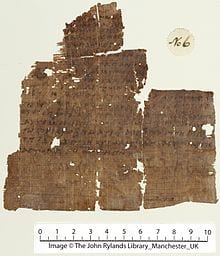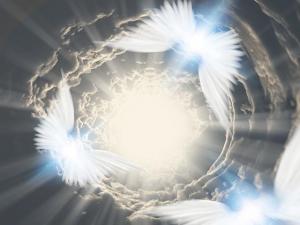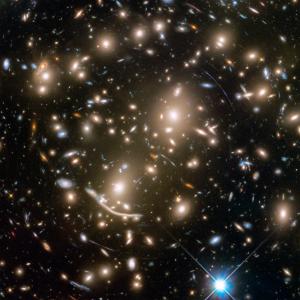
This post is an introduction to a series about angels, and it says approximately nothing about angels. Instead, it looks at a world from which angels, or anything spiritual below God, seem to have been removed. It sets the stage for a re-entrance of angels in a more biblical, and more relevant, sense than we usually imagine. If you have fallen out of love with angels in the course of your grown-up years, you might find yourselves, like me, liking them once again.
Other posts in the series:
- Freedom Fighter Hamer Wrestles with Spiritual Wickedness in High Places
- Where are All the Angels? — One God, One Story, One World
- The Powers that Be: Walter Wink and the Angels in the New Testament
- Angels of the Cosmos, or Are We Alone in the Universe
- Cosmos and History: Connecting the Angels
- What about the Traditional Angels, and What’s the Point of Angels, Anyway
The Bible and the material world
In the previous post I wrote positively about the Church’s attitude toward the material world. Perhaps I was too easy on the Church. Today some people say that the Church’s Bible is the major force behind the ecological crisis. Disenchantment of the material universe followed biblical belief in only one God. Lordship over creation that the Bible’s first chapter gives to human beings came to be more like domination. Christians have been complicit in the devaluing of nature and the ecological harm the modern world perpetrates on her.
“Fill the earth and subdue it. Have dominion over the fish of the sea, the birds of the air, and all the living things that move on the earth,” (Genesis 1:28)
Christians have more than taken this precept to heart. Christian feminists, minority advocates, and those concerned about the environment (along with similarly concerned non-believers) notice a pattern: The male, powerful, white God has dominion over everyone and everything; men have dominion over women, people in power over those without power, the white race over everyone else; and finally, the human race dominates the entire non-human world.
Elements of this domination system were present in human cultures before disenchantment banished spiritual elements from nature . The subjugation of women by men in Jewish and Christian history is milder than that found in some other cultures. The Bible doesn’t entirely change, but it does soften that and some other forms of domination. But it’s undeniable that in the Christian world dominion and, not to mince words, tyranny over nature has been exercised to an extent far beyond what any other culture ever dreamed of. Is this really what the Bible envisions?
Dominion, Genesis to Jesus
The Bible speaks with more than one voice. Dominion finds a reflection in Psalm 8:
You have given them [humans] rule over the works of your hands, put all things at their feet.
But alongside this is the idea of care-taking. Adam in the Garden of Eden was “to cultivate and care for it.” (Genesis 2:15) There’s the idyllic vegetarian diet prescribed in Genesis Chapter 1, the forbidden fruit in Chapter 2, and the prohibitions of working on the Sabbath and eating pork. All of these mandate limitations on our use of nature. The Tower of Babel story reflects on the limits to human power and pride.
Even when the Bible speaks of dominion, it means nothing like the way we treat nature and anyone who is “other” today. God tells the sun and the moon to govern the day and night. It’s a model that gives scant support to dominion as enslaving a race or a sex or destroying nature in the pursuit of wealth. At the other end of the Christian Bible we find the words of Jesus about dominion:
You know that those who are recognized as rulers over the Gentiles lord it over them, and their great ones make their authority over them felt. But it shall not be so among you. Rather, whoever wishes to be great among you will be your servant; whoever wishes to be first among you will be the slave of all. For the Son of Man did not come to be served but to serve…. (Mark 10:42-45)
The Bible sometimes presents a picture of a dominating God, but its basic direction was toward a God who participates in the struggles of the created world. God called creation good in the beginning, loves it, nurtures its goodness, and gets upset when humans don’t act accordingly.
Disenchantment
The world was an enchanted place, where humans could often feel less than dominant, through history up to the Middle Ages. All sorts of spirits, from gods to elves, inhabited it. Today, if we believe in a spiritual world, that world is separated from the world of matter by a wide gulf. Guardian angels cross that gulf, but we can’t see them. Perhaps children can.
Some of us believe in ghosts and associated paranormal phenomena, but they don’t really belong in this world. Supposedly, ghosts got caught in between, not able to let go. They should abandon our world, and we should help them get on to the next one. Since the end of the Middle Ages, science imagines our world as spiritually dead, not a good place for spirits. For most of us most of the time disenchantment is the way we think and live.
A little science history: the Church and Galileo
To understand how this spiritual deadening in our view of the world happened, you need to know more about the conflict between the Church and Galileo Galilei than just their fight over whether or not the earth moves. Copernicus had already proposed that the earth orbits around the sun and had gotten a mixed reaction from churchmen. Some ecclesiastics actually liked the theory. And when Galileo first proposed another version, Pope Urban VIII was willing to give it a hearing. But two things got Galileo in trouble.
First, he showed his lack of political smarts with an unintended insult of Pope Urban. This papal friend had asked him to write a treatise giving both sides of the argument. Galileo did so in the form of a dialogue. Unfortunately he put the Pope’s traditional ideas into the mouth of a character named Simplicio. He said he got the name from that of a venerable ancient astronomer, Simplicius, but in Italian it sounded a lot like Simpleton. I guess Galileo just couldn’t understand the negative reaction he got from clerical circles.
Second, Galileo was enormously smart mathematically and scientifically. He’s been called the father of modern mathematical science, the science that uses mathematics to explain how things happen. Galileo explained according to what rule the earth goes around the sun, something Copernicus never tried to do.
Scientists had already begun using mathematics. Galileo used it to explain the behavior of falling bodies, predicting correctly that a heavy body and a light one would fall at approximately the same speed. Aristotle, apparently without trying it out, taught that a heavy body would fall faster than a light one. The famous leaning tower of Pizza experiment, proving that they both fall at the same speed, probably never occurred. Galileo worked with balls rolling down inclined planes.
The end of teleology
This was the beginning of the end for the scientific use of teleology—the idea that there is purpose in nature, that things do what they do guided by some purpose. For example, a heavy body falls down because it belongs down there, and the heavier it is the more strongly it “aims” to go there.
Teleology was an important idea in the ancient and medieval world. Purpose in the natural world supported morality in the human world. Natural things do what they’re supposed to do, and so should humans. “Look at the industrious ant. You should follow their example.” (Funny, nobody ever suggested we imitate the lion, who sleeps 22 hours a day.)
Societal structures also found support in a natural world arranged according to higher and lower realms. The four elements, earth, water, air, fire, have their various natural places in the hierarchy. Earthen matter sinks to the lowest places, and fire strives for the highest. Popes and kings could feel secure, or at least justified, in such a system. Somebody had to occupy the higher spots.
When mathematics started making inroads into science, things started leveling out. All material things, no matter what their composition follow the same mathematical laws. This was a much bigger challenge than simply saying that the earth goes around the sun.
Until Galileo no one had pushed this leveling beyond the earth. The heavens, even in Copernicus’ system, were a different, higher kind of matter, with the name “aether.” Teleology reigned in the heavens. The heavenly bodies were there because they belonged there, and they moved, according to the perfection of their nature, in perfect circles. (Copernicus made a gallant and unsuccessful attempt at reconciling these perfect circles with what he observed. Actually, the planets trace ellipses, not circles, around the sun.)
A modern worldview
Galileo realized that the same mathematical laws that explained the movement of falling bodies on earth could explain the movements of the planets around the sun – and four of Jupiter’s moons, which he discovered. The heavens and the earth don’t contain two radically different kinds of matter.
Eventually, Galileo’s theory won out, and a new view of the world arose. No longer did people find the things they considered most human supported in the non-human world. Purposeful behavior and morality did not exist there. Higher and lower did not exist there. The spirit had gone out of nature. All was mechanism.
Previously thinkers described the natural world in organic terms, as if it were a living, sensitive being. Now it’s as a giant machine. Even living things, including the human body, were machines operating by mechanical laws.
But the mind and the products of the mind—ideas, purposes, works of beauty, the sciences, ethics, and the arts—these were something else. They were a completely different kind of thing, spiritual, not material. Human being itself was split into two realms, body and spirit (a “ghost” in a machine), which didn’t quite belong together. The “old” world was multi-dimensional, stretching from rocks to the heavens and beyond. in that world humans occupied several dimensions at once, being mineral, vegetable, animal, and spirit. Now there are only two dimensions, and what is specifically human is only the spiritual part.
Back to today.
René Descartes, with his “I think, therefore I am,” put the finishing touches on this separation of the material and spiritual worlds. He thought the new development was great for both religion and science. Each could now operate unencumbered in its own sphere.
I don’t know if this de-mystifying of the natural world is in any way responsible for the ecological crisis we are now in, as some environmentalists claim. We have less respect for nature than we might have if we could see gods all around us. But has belief in the gods has ever stopped the human race from doing what it could to “have dominion” over the places where it has lived. More likely it’s just that we can do a whole lot more now.
We’re powerful enough now to imagine that we really are on our own in this world. We don’t often think of help coming from powers other than our own. Even less do we imagine ourselves fighting any superhuman power.
But there are exceptions. The story of one such exception is a feature of the next post in this series. Spirits still make their presence felt.
Image credit: iPerceptive via Google Images












